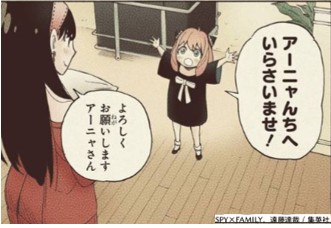In this blog, we will teach you Japanese language through Manga and Anime. The first…
Good day, or rather, good evening, everyone!
Continuing from #6, this is the second half of “Greetings and Useful Expressions”.
Let’s more learn “Survival Japanese”!
If you want to read only this article or want to read this article before the first half of “Greetings and Useful Expressions” the article #6, the description of the structure and precautions are explained in the bottom of the article #6. ou can keep reading without reading that, but I think you’ll get the most out of the article.
Greetings when meeting for the first time
Polite style of speech : はじめまして
Useful greeting
Polite style of speech : どうも
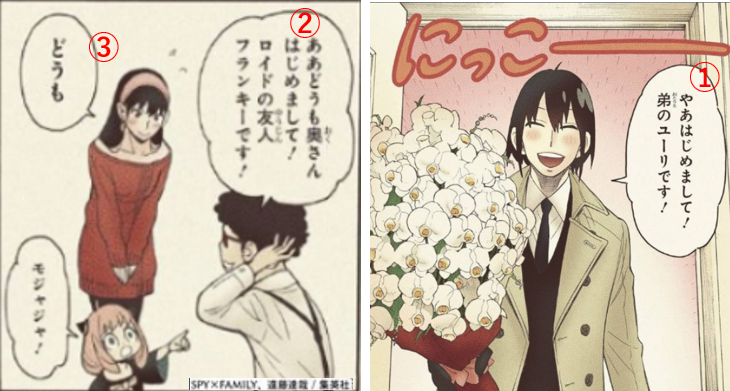
<Explanation>
Yuri “It’s great to meet you! I’m Yor’s brother Yuri!”
② フランキー 「ああ どうも 奥さん はじめまして!ロイドの友人 フランキーです!」
Franky: Oh, and you must be Mrs.Forger! I’m Loid’s friend Franky!
③ ヨル「どうも」
Yor “My pleasure”
When you meet someone for the first time, the greeting is 「はじめまして」. It is often used with your name and self-introduction of what kind of person you are. In ①, Yuri uses this greeting to indicate that she is Yor’s brother and her name, and in ②, Franky also uses this greeting to indicate that she is Loid’s friend and his name.
On the other hand, in ③, Yor only says 「どうも」 to Franky. Frankie calls Yor “Mrs.Forger” so he knows he already knows who she is. Yor doesn’t need to introduce yourself.
「どうも」 is a very useful word. Franky also uses it lightly at the beginning, saying, 「ああ どうも」. In fact, this 「どうも」can be used instead of various greeting words. For extample:
- Thank you
- Hello
- Nice to meet you/My pleasure
etc.
However, even though it is a polite phrase, if you just say 「どうも」 it can give off a slightly casual and shy impression, so in formal situations it would be better to add more words like Franky .
Greetings to those you will be taking care of, those you want to be friends with, and those you plan to spend time with for a long time
Plain style of speech:よろしく
Polite style of speech:よろしくお願いします
Greetings when guest visits your home or when a clerk greets customer at a store
Plain style of speech:いらっしゃい
Polite style of speech:いらっしゃいませ
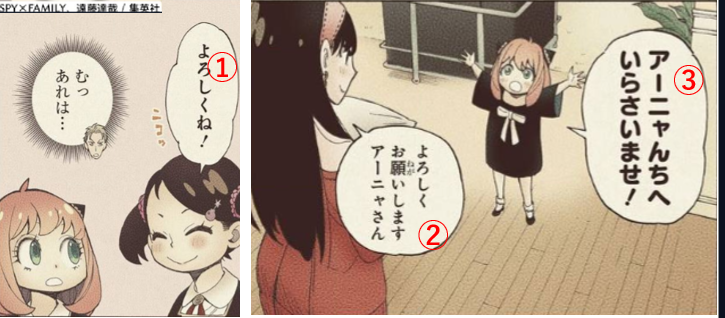
<Explanation>
① ベッキー 「よろしくね!」
Becky “Hi there!”
② ヨル 「よろしくお願いします アーニャさん」
Yor “Thank you, Anya. It’s lovely.”
③ アーニャ 「アーニャんちへ いらっさいませ!」
Anya “Welcome to Anya’s house!”
These words are expressions unique to Japanese, and there is no perfect fit translation in it fits perfectly in English and other languages! The situations like “SPYxFAMILY” frames above are just the perfect example of these words being used!
① is the scene where Becky and Anya meet for the first time. Since they were put in the same class, Becky said to Anya,「よろしくね」implying that “I’ll be spending a lot of time with you from now on, so let’s be nice each other.” .
The 「~ね」 at the end is a very common expression that is used at the end of words and sentences to show friendliness and to add feelings of seeking sympathy from the other person.
② is the scene where Yor came to live with Anya and Loid in the house. She greets Anya with the feeling that “From now on, I will spend every day with you as a family. Please take me in as a member of your family, I’ll try my best.”
Even if it’s not as long as a year, for example, when a guide takes you on a day trip for a few hours to a whole day, you can greet each other with 「よろしくお願いします 」 at the beginning.
It’s a very “Japanese” expression.
As for ③, Anya’s line, the expression 「(someone)んち」is almost slang in the form of 「(someone)のうち」, a very casual and broken down form. 「のうち」 is a casual way of saying 「(someone)の家 – “home of someone”」. All of them are used quite often in practice.

ロイドとヨル 「いらっしゃい!」
「いらっしゃいませ」 is a word that you will hear at any shop when you come to Japan. It’s closer to “Welcome” than “Hello”.
As for ③,「アーニャの家へ いらっしゃいませ is correct.「いらっさいませ」 is Anya language, she is not able to pronounce it well. The sound of 「いらっしゃい」 that Loid and Yor say in the upper frame is correct. If you say it politely, it will be「いらっしゃいませ」.
Greeting when parting
Plain style of speech:じゃあじゃーね/じゃあ また/それじゃ
Polite style of speech:では 失礼します
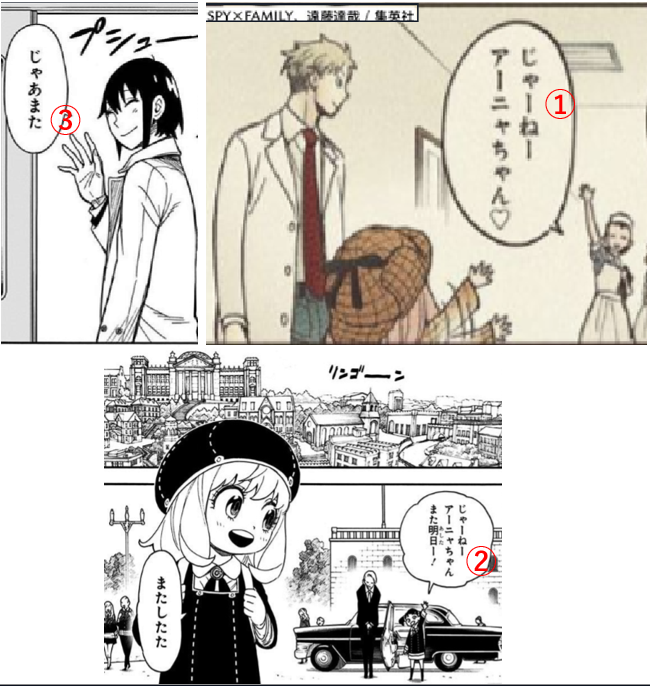
<Explanation>
①看護師 「じゃーねー アーニャちゃん♡」
Nurse “See you, Anya-chan♡”
②ベッキー 「じゃーねー アーニャちゃん また明日ー!」
Becky “See ya’ tomorrow, Anya-chan!”
③ユーリ「じゃあまた」
Yuri “See you later”
A famous greeting in Japanese when parting is 「さようなら」, but it is not often used in real life nowadays. As proof of that, “Goodbye” has never been used in the 11 volumes of “SPYxFAMILY” that have been released so far. It’s a very formal expression, as you can sense that there are no plans to meet for a while.
Recently, 「では」,which is “word that indicates the or end of something with a break” is used as greetings when parting. And the sound of 「では」has changed to casual 「じゃ」and「じゃあ」. Japanese natives also use these words very often as casual greetings.
The 「じゃーねー」 in ① and ② are expressions with「~ね」 to make 「じゃ」 more friendly.
③「じゃあ また」 is an expression in which “again” is added to 「じゃあ 」. The word 「また」 only means “again", but when used as a farewell greeting, it includes the meaning of 「"また"会いましょう-”See you again”」.
Becky’s final phrase, 「また明日!」is an idiom that omits 「会いましょう–“”See you”」 from 「また明日会いましょう-“See you tomorrow”」.
It is also common to add 「ね」 to 「また」 to say 「じゃあ またね」, or after「明日」 to say 「また明日ね」.

④ロイド「それじゃ 失礼します」
Loid “Well, then, excuse me.”
Loid “Well, good for you. Then.”
The expressions 「それじゃ」 in ④ and ⑤ are rather casual expressions. In formal situations, it is better to use 「では」 or 「それでは」.
In addition, the polite phrase 「 失礼します」which is a shortened version of the old saying “I’m going to leave in front of you, even though it’s rude,-失礼ではございますが、先立ちさせていただきます” is now used by adults at work and in formal settings.
In addition, the polite phrase “excuse me,” which is a shortened version of the old saying “I’m going to leave in front of you, even though it’s rude,” is now used by adults at work and in formal settings.
Finally, about gestures.
Loid in ④ is talking to Donovan Desmond, a politician who is Damian’s father, and is the target of Operation <Strix> , so he politely says goodbye and bows while looking at him.
In ⑤, Loid is waving lightly, with the other person being a close Frankie. Oh, Loid waves his hand without looking at Franky, but please do look at the other person and wave your hand. Busy person Loid has been summoned for a personal favor, so he is just showing Frankie his dismayed attitude. ①②③The nurses, Becky, and Yuri are waving their hands in each frame. It is a casual goodbye gesture and very common.
Asking if something or someone is okay
Plain style of speech:大丈夫?
Polite style of speech:大丈夫ですか?
Telling that something or someone is okay
Polite style of speech:大丈夫です
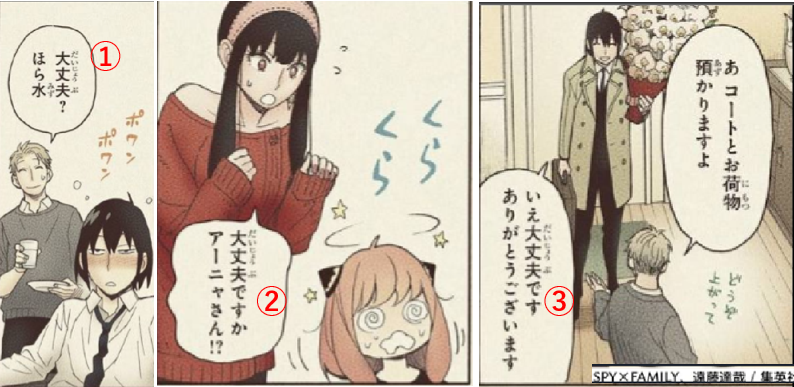
<Explanation>
Loid “Are you feeling okay? I brought you some water.”
②ヨル「大丈夫ですか アーニャさん⁉」
Yor “Anya, are you okay!?”
③ユーリ「いえ 大丈夫です ありがとうございます」
Yuri “Oh no thank you. I’m fine.”
Even if you don’t use the expression 「大丈夫」 yourself, you’ll often hear Japanese say it. As a rule of thumb, if you want to ask if something or someone is okay, just say「大丈夫?」 In conversational Japanese, questions are pronounced with the final sound slightly raised. In this case, raise the 「ぶ 」 sound.
If the answer is no problem, say “「大丈夫!」. This time I will not raise the 「ぶ 」 sound.
Easy! Isn’t it?
If you want to be polite and ask if something is okay:
「大丈夫ですか?」(Raise the 「か」sound.)
If the answer is no problem:
「大丈夫です」(Don’t raise any sound.)
I will explain the grammar in another article, so let’s memorize this useful expression for now!
When you buy something in a store
Polite style of speech:~ください/~を ください/~と~を ください
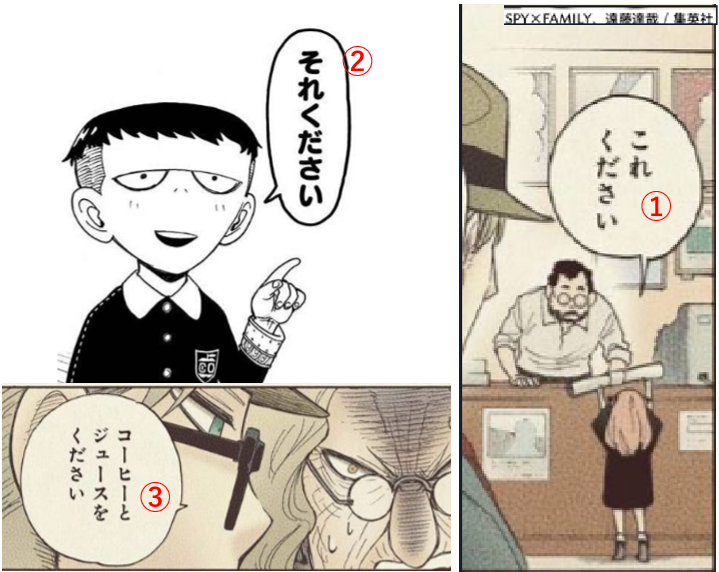
<Explanation>
①アーニャ「これ ください」
Anya “This, please!”
②ジョージ 「それ ください」
George “Give me those, please.”
③ロイド 「コーヒーとジュースをください」
Loid “A coffee and a juice, please.”
Overseas, it is normal for customers and clarks to exchange greetings of “Hi” at convenience stores, etc., but in Japan, customers don’t talk much, and clarks unilaterally say 「いらっしゃいませ」「買い物袋はご入用ですか-“Do you need a shopping bag?”」「○○円です-“It’s ○○ yen” 」「ありがとう ございます 」. We Japanese don’t think it’s particularly disrespectful to each other, so don’t worry too much about it. Of course, there are occasional customers who say hello.
The number of restaurants where you just buy a meal ticket from the vending machine at the entrance and order from the tablet on the table without conversation is increasing.
However, there are still many restaurants where you order from a waiter or waitress while looking at a paper menu. When you enter such a shop, remember this expression.
「~ください」is a literal translation of ”Give me ~,please” or ”I’ll take ~, please”.
「これ」is a demonstrative word,this”, used to indicate something that is near you or that you can point to or pick up. In the frame above, Anya is handing the poster to the shopkeeper, saying ① 「これ ください」.
「それ」is “it/that”, and is used for things that are not close enough to you to pick them up, but are close enough to be pointed at or are close to the person who you are talking to.
In the panel above, George is looking straight ahead and pointing in the same direction while saying ② 「それ ください」「それ ください」 Because the person George is talking to is right in front of him, and nearby there is「それ」.
If you can say in Japanese what you want, put「を」after the thing you want and 「ください」at the end. If you want juice,:
「ジュースをください」
If you want more than one item, connect the items with「と」. If you want coffee and juice,:
「コーヒーとジュースをください」
If you want tea, coffee and juice,:
「お茶とコーヒーとジュースをください」
Greetings at the beginning of eating a meal or feasts
Polite style of speech:いただきます
Greeting after eating
Polite style of speech:ごちそうさま

<Explanation>
ユーリ「いただきます!」
ベッキー「いただきまーす!」
This is also a word that is often taken up as sounding very “Japanese”. Japanese children are tought to put their hands together and say 「いただきます」 before eating and to say 「ごちそうさま」 after eating.
「いただきます」 comes from 「食事をいただく-“I kindly receive a meal,”」, which means “I have a meal” but in this expression the speaker put him/herself low, and look up to the nature and the meal itself as the blessings of nature. 「いただきます」 is also a word of gratitude for the food itself, the crops that are the blessings of nature, and the people involved in cooking. .
There are some Japanese who inadvertently say this word when he/she eats feasts, sweets, or his/her favorite foods that he/she can’t usually eat, with the feeling in mind “I’m so happy that I can eat this!” ,even when no one is around, even if it’s not about the three meals a day, breakfast, lunch and dinner,
What a beautiful and interesting custom! Don’t you think so, too?
If you spend a few days in Japan and when you are used to hearing Japanese sound, try listening to the conversations around you . You would notice that the greetings and expressions introduced in #6 and #7 are used surprisingly often. Even if you say that speaking Japanese is still a bit hard, just being able to catch some words and get the meaning of them makes you happy, I believe.
Please enjoy learning Japanese with your own pace. 🙂
⇒See you at #8!!!
Words (only those not explained in the article)
- noun:N
- verb:V
- adjective : Adj
- i-adjective : i-adj.
- na-adjective:na-adj.
- adverb :Adv
- やあ Interjection- hi
- 弟 N- younger brother
- (Noun +)です Auxiliary verb- This word is attached to the back of nouns, adjectives and verbs to form “predicate. “Predicate” expresses the action, nature, or state etc. of the subject.
- の Particule- Particle represents the relationship between words and words, words and predicates, sentences and sentences, and adds meaning to words. In this article, 「の」adds the meaning of possession.
- ああ Interjection- oh
- 奥さん Pronoun- madam
- 看護師 N- nurse
- そうか Interjection- I see/well/then
- よかったな – (it’s) good for you.
